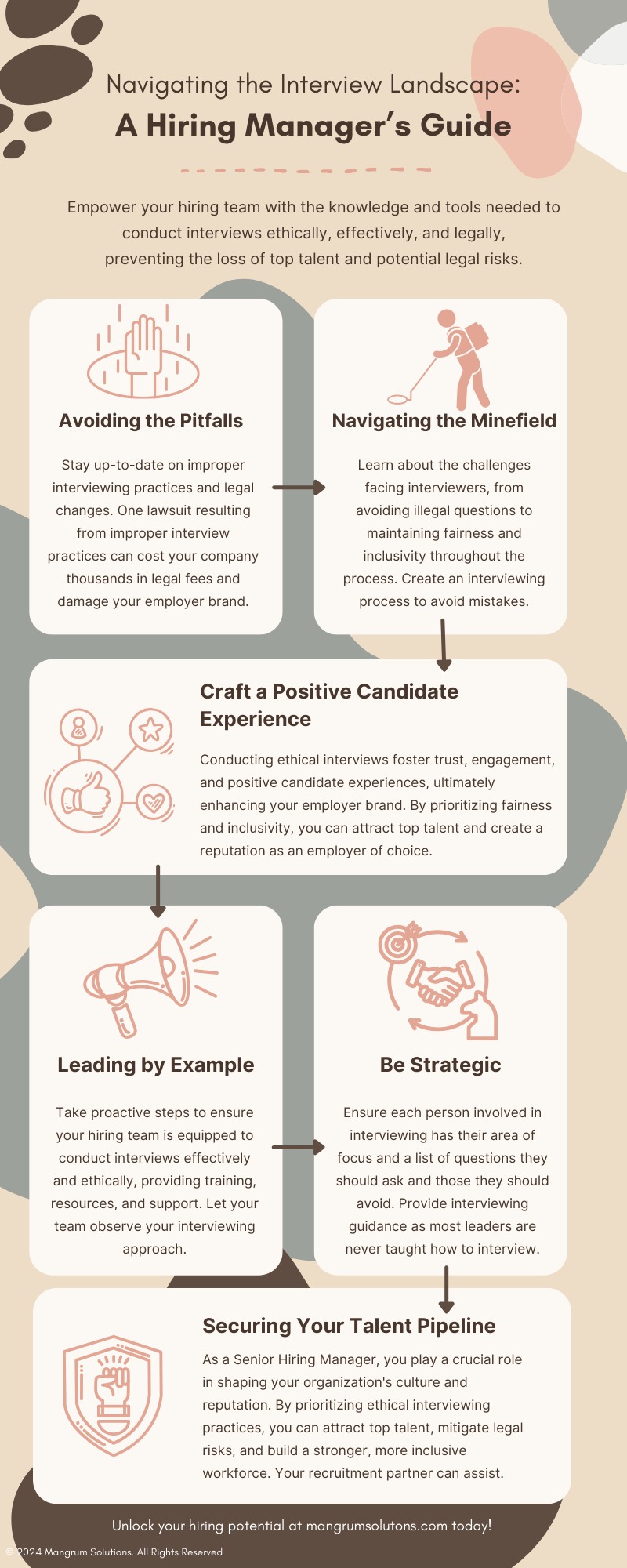Strategic Guide for Hiring Managers to Improve their Team’s Interviewing Approach
In today’s competitive job market, successfully attracting and hiring top talent requires more than just conducting ethical interviews. It demands a comprehensive strategy that encompasses ethical practices, strategic processes, diversity promotion, and candidate-centric approaches. Here’s how you can ensure your talent acquisition efforts are not only ethical but also strategic, inclusive, and ultimately successful. Enjoy the infographic and then scroll below for more insightful training tips and tools.

Elevating Your Hiring Game with an Ethical and Effective Approach
In today’s competitive job market, conducting interviews is more than just a formality – it’s a strategic process that can make or break your organization’s success. Here’s how you can ensure your interviewing practices are ethical, effective, and aligned with your hiring goals.
- Asking the Right Questions: Staying Legal, Up-to-Date, and Relevant It’s crucial to stay informed about evolving legal regulations surrounding the interview process. For example, it’s now illegal in many states to ask candidates about their salary history or inquire about their age, marital status, religion, or other protected characteristics. Yet, these questions are still often posed by well-intentioned but untrained hiring managers. To stay current, consider renewing training for your team on a regular basis. Websites like SHRM (Society for Human Resource Management) offer valuable resources and updates on legal guidelines. Additionally, consider inviting an expert to provide annual updates on interview best practices and legal compliance.
- Creating a Structured Interview Process: Utilizing Expertise, Efficiency, and Diversity A structured interview process is essential for fairness and consistency. Partnering with a reputable search firm can provide targeted questions tailored to each interviewer’s expertise, ensuring topics are thoroughly explored without unnecessary overlap. For example, one interviewer may focus on leadership strengths, while another adopts a topgrading approach, and another delves into specific role-related skills. This approach streamlines the process and ensures a comprehensive evaluation of each candidate.
- Training Your Interviewers: Investing in Development and Expertise Many managers are promoted to interview candidates without formal training or guidance. Investing in training resources, such as books or online courses, can provide valuable insights into effective interviewing techniques. The book “Hiring for Attitude” by Mark Murphy offers practical advice for assessing candidate fit beyond skills and experience. Additionally, consider enrolling in formal training courses offered by organizations like LinkedIn Learning or the Human Resources Certification Institute (HRCI).
- Promoting Diversity and Inclusion: Strengthening Your Team and Enhancing Innovation Hiring for diversity isn’t just about meeting quotas – it’s about building a stronger, more innovative team. Resources like DiversityInc and Glassdoor’s Diversity and Inclusion Guide offer strategies for attracting and retaining diverse talent. Emphasize the benefits of diversity to your team, including improved decision-making, creativity, and employee engagement. Consider leveraging recruitment platforms like Jopwell or Women Who Code to source diverse candidates.
- Focusing on Behavioral Interviewing: Getting to the Heart of the Matter Behavioral interviewing is a powerful technique for assessing a candidate’s past behavior and predicting future performance. Instead of hypothetical questions, ask candidates to provide specific examples of how they handled challenges or achieved success in previous roles. For example, “Can you tell me about a time when you had to resolve a conflict with a coworker? How did you approach the situation, and what was the outcome?” This approach provides valuable insights into a candidate’s problem-solving abilities and cultural fit.
- Evaluating Cultural Fit: Finding Your Tribe and Building Cohesion Cultural fit is essential for long-term employee satisfaction and organizational success. Every interaction with a candidate – from the initial phone call to the final interview – is an opportunity to assess cultural fit. Look for alignment with your company’s values, mission, and team dynamics. Consider incorporating team introductions prior to hiring to gauge chemistry and ensure alignment with existing team members. Assessing cultural fit isn’t just about the candidate fitting into your company culture – it’s also about your team embracing and supporting the candidate.
- Rolling Out the Red Carpet: Enhancing the Candidate Experience and Showcasing Your Company Culture Creating a positive candidate experience is key to attracting and retaining top talent. From the moment a candidate walks through the door, ensure they feel welcome, comfortable, and valued. Avoid long pauses or making candidates wait unnecessarily before interviews. Offer amenities like water and snacks, and consider giving them a tour of your facility to showcase your workplace culture. Communicate expectations to all employees involved in the interview process and limit panel interviews to reduce intimidation. Make sure all employees are aware that creating a positive candidate experience is a priority and part of the company culture.
- Providing Feedback and Communication: Closing the Loop and Building Relationships After each interview, provide timely and constructive feedback to candidates, regardless of the outcome. This demonstrates respect for their time and effort and helps them improve their interview skills for future opportunities. Keep lines of communication open throughout the hiring process to keep candidates informed and engaged. Building a positive relationship with candidates, even those who are not selected, can enhance your employer brand and encourage referrals and future applications.
By implementing these strategies and providing additional training for your team, you can transform your interview process into a strategic asset that attracts top talent, mitigates legal risks, and fosters a diverse and inclusive workplace culture. Remember, ethical interviewing isn’t just the right thing to do – it’s also the key to building a high-performing team that drives success for your organization.
Anjela Mangrum, the founder of Mangrum Career Solutions, is a trusted authority in executive recruitment for the manufacturing industry! She’s dedicated to matching top-tier candidates with rewarding opportunities in the field. Connect with her on LinkedIn and join the MCS LinkedIn group for the latest in manufacturing recruitment news and trends. Let’s partner in your hiring success!


